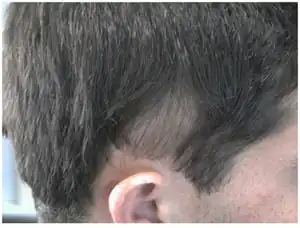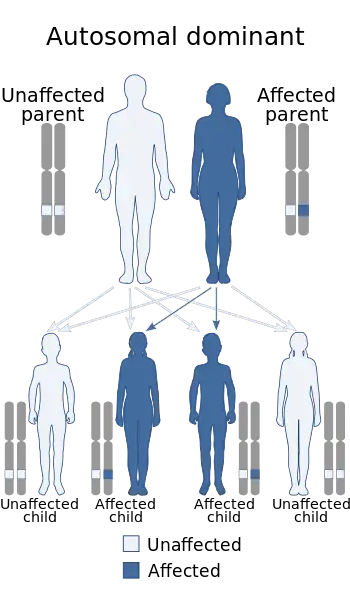Triangular alopecia
| Triangular alopecia | |
|---|---|
| Other names: Temporal alopecia and Temporal triangular alopecia[1] (TTA) | |
 | |
| TTA, Right temple | |
Triangular alopecia is hair loss that may be congenital but usually appears in childhood as a focal patch of loss that may be complete or leaving fine vellus hairs behind.[2]: 643
Affected individuals are typically entirely healthy. Hair restoration surgery using follicular unit transplantation has been a successful treatment modality for TTA
Signs and symptoms
It usually appears in childhood as a focal patch of loss that may be complete or leaving fine vellus hairs behind.[2]
Cause and mechanism

TTA has been associated with several disorders, such as Phakomatosis pigmentovascularis. And a rare syndrome Setleis syndrome. It is inherited by the autosomal dominant trait and is characterized by cutis aplasia or atrophic skin at the temples, which is said to resemble forceps marks. There may also be a coarse facial appearance, anomalies of the eyelashes and eyebrows, and periorbital puffiness.[3]
Diagnosis
The diagnosis of this condition, triangular temporal alopecia, is clinical.Dermatoscopy can help differentiate this condition from alopecia areata and male pattern alopecia.[4]
Treatment
In terms of treatment, hair transplants have been used successfully[4]
Frequency
The suggested frequency for this condition in the general population is around 0.11%. The hair loss is non-progressive and does not expand beyond these areas. It is a non-inflammatory, non-scarring form of hair loss easily confused with alopecia areata. In one report, the condition was incorrectly believed by the parents to be induced by doctors inserting intravenous cannulas into scalp vessels during the neonatal period. The condition is permanent and the affected skin does not change later in life.[5]
Of the 53 reported cases of TTA, more than half (55.8%) were detected in childhood between the ages of 2 and 9 years, while 36.5% were detected at birth and only 3.8% (only two cases) in adulthood.[6]
See also
References
- ↑ Rapini, Ronald P.; Bolognia, Jean L.; Jorizzo, Joseph L. (2007). Dermatology: 2-Volume Set. St. Louis: Mosby. p. 996. ISBN 978-1-4160-2999-1.
- 1 2 Freedberg, et al. (2003). Fitzpatrick's Dermatology in General Medicine. (6th ed.). McGraw-Hill. ISBN 0-07-138076-0.
- ↑ "Archive copy". Archived from the original on 2017-09-18. Retrieved 2022-02-16.
{{cite web}}: CS1 maint: archived copy as title (link) - 1 2 "Triangular temporal alopecia | DermNet NZ". dermnetnz.org. Archived from the original on 13 August 2021. Retrieved 24 April 2022.
- ↑ "Other alopecias - congenital triangular alopecia". Archived from the original on 2011-07-13. Retrieved 2022-02-16.
- ↑ 26955-temporal-triangular-alopecia-and-a-review-of-52-past-cases